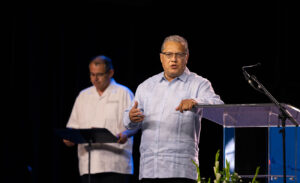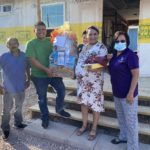MCALLEN—In its earliest days, devotion and generosity characterized Christ’s church—the household of God, Ellis Orozco told the opening session of Texas Baptists’ Family Gathering in McAllen.
Those same things to which the first century Christians were devoted and the same areas in which they demonstrated generosity should mark the family of God today, he insisted.

Orozco, a longtime Texas Baptist pastor and now public theologian in residence at Stark College and Seminary and coach to pastors with Karooso Ministries, spoke about his own family of origin.
As Orozco preached in English, Jesse Rincones, executive director of Convención Bautista Hispana de Texas, translated the sermon into Spanish.
Orozco recalled his grandfather, who left Monterrey, Mexico, in 1919 and moved to Texas. His grandfather eventually built a home and raised nine children in a small house on five acres at the end of a caliche road south of Houston.
In time, the entire extended family—Orozco’s parents, his father’s brothers and sisters, and their wives and children—all built homes along that caliche road.
When two of his father’s brothers died, Orozco recalled how his dad provided for the two young widows and helped raise their children, eventually putting three girls through college.
When Orozco grew up and asked his father why he had sacrificed so much and given so much for children who were not his own, he replied: “They’re family. That’s what you do for family.”
Likewise, the early church lived as family—a household deeply devoted to the Scriptures, to fellowship, to remembering Jesus through the breaking of bread and to prayer.
Sign up for our weekly edition and get all our headlines in your inbox on Thursdays
Orozco again recalled his grandfather’s words to him: “Never forget who you are and where you came from. Never forget your people.”
The same holds true for the household of God, he asserted.
“We are forgetful creatures. We need to be reminded,” Orozco said. “Never forget who you are in Christ. Never forget who your family is in Christ.”
Demonstrating generosity
The household of God as seen in Acts 2 demonstrated generosity in four ways, he noted:
- Sharing resources. Many who became followers of Christ were ostracized by their communities and disowned by their families, Orozco said.
“The church—their new family—was the only family they had left, the only community they had left,” he said.
The church provided for its members quite naturally, Orozco observed, noting the lesson he learned from his father.
“That’s what family does. We take care of each other,” he said.
- Giving to those in need. The household of God willingly sold their goods to meet the real needs of others as prompted by the Holy Spirit, he noted.
- Indiscriminate hospitality. The early Christians went to the temple court, where they knew people were gathered, and issued blanket invitations to fellowship meals in their own homes.
- Sharing Jesus with the world. Jesus provided the greatest imaginable evangelistic strategy the night he washed his disciples’ feet, commanded them to do the same, and told them the world would know they were his followers by the love they showed to one another, Orozco said.
“When the world looks at your church, what do they see? Do they see a church with arms open wide, or a church with clenched fists, fighting each other and fighting the world?” he asked.
Serve the Savior, not fight culture wars
Rather than see people in the world as enemies who must be defeated in a culture war, Christ’s church is called to show the love of Jesus, he insisted.
“I’m not called by God to save our culture or to preserve some nostalgic view of the American dream. … I’m not called to fight some culture war. I’m called to serve the one who said to love one another, to love your enemies and to turn the other cheek,” Orozco said.
“All empires will fade away. All manmade institutions will die. But Jesus will still reign. The church will still live on.”
Christians are called to “do the hard thing” and take a courageous “leap of faith” into the kind of life Christ demonstrated, he asserted.
“In our polarized world, it’s difficult to choose love over hate, hospitality over discrimination, kindness over acrimony, and prayer over criticism. It’s hard,” he said.
It takes courage to “stand with the oppressed, the marginalized and the foreigner,” he acknowledged.
“But if you muster the courage to do it, you find yourself in good company.”
















We seek to connect God’s story and God’s people around the world. To learn more about God’s story, click here.
Send comments and feedback to Eric Black, our editor. For comments to be published, please specify “letter to the editor.” Maximum length for publication is 300 words.